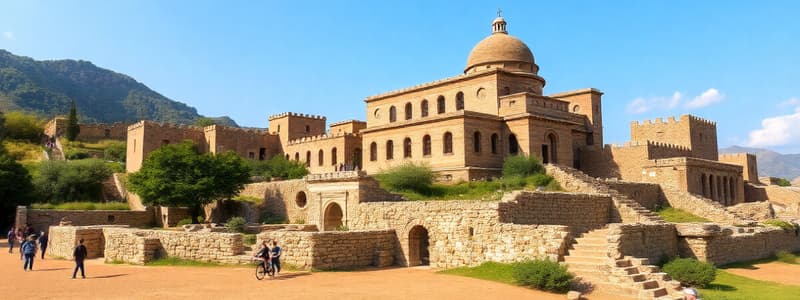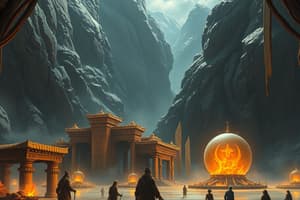Podcast
Questions and Answers
किस युग को लिखित अभिलेखों से पहले का माना जाता है?
किस युग को लिखित अभिलेखों से पहले का माना जाता है?
- उपनिषद युग
- मध्यकाल
- प्राचीन इतिहास
- प्रागैतिहासिक युग (correct)
किस काल में व्यवसायीकरण और औद्योगिक क्रांति का उदय हुआ?
किस काल में व्यवसायीकरण और औद्योगिक क्रांति का उदय हुआ?
- पुनर्जागरण
- प्रारंभिक आधुनिक काल
- प्राचीन इतिहास
- आधुनिक इतिहास (correct)
किस प्रमुख विचारधारा का अध्ययन इतिहासकार अपने शोध में करते हैं?
किस प्रमुख विचारधारा का अध्ययन इतिहासकार अपने शोध में करते हैं?
- सामाजिकता
- अवधारणावाद
- मार्क्सवाद (correct)
- उपकारवाद
किस महत्वपूर्ण घटना के दौरान सामंती प्रणाली का विकास हुआ?
किस महत्वपूर्ण घटना के दौरान सामंती प्रणाली का विकास हुआ?
किस प्रक्रिया को समझाने के लिए इतिहासज्ञ घटनाओं के कारण और प्रभाव का अध्ययन करते हैं?
किस प्रक्रिया को समझाने के लिए इतिहासज्ञ घटनाओं के कारण और प्रभाव का अध्ययन करते हैं?
किस दर्शक ने भारतीय स्वतंत्रता आंदोलन में महत्वपूर्ण भूमिका निभाई थी?
किस दर्शक ने भारतीय स्वतंत्रता आंदोलन में महत्वपूर्ण भूमिका निभाई थी?
किस काल को कलात्मक और वैज्ञानिक पुनर्जागरण के रूप में पहचाना जाता है?
किस काल को कलात्मक और वैज्ञानिक पुनर्जागरण के रूप में पहचाना जाता है?
किस संस्थान के अध्ययन से इतिहास को लिखा और व्याख्यायित किया जाता है?
किस संस्थान के अध्ययन से इतिहास को लिखा और व्याख्यायित किया जाता है?
Flashcards are hidden until you start studying
Study Notes
Overview of History
- Definition: The study of past events, particularly in human affairs.
- Importance: Understanding history helps to comprehend present circumstances and informs future decisions.
Key Periods in History
-
Prehistoric Era
- Before written records.
- Includes the Stone Age, Bronze Age, and Iron Age.
-
Ancient History
- Emergence of writing (~3000 BCE).
- Notable civilizations: Mesopotamia, Ancient Egypt, Indus Valley, Chinese dynasties, Ancient Greece, and Rome.
-
Middle Ages (500-1500 CE)
- Divided into Early, High, and Late Middle Ages.
- Key events: Feudalism, the spread of Christianity, and the rise of Islamic empires.
-
Renaissance (14th-17th Century)
- Cultural revival in art, literature, and science.
- Humanism became prominent.
-
Early Modern Period
- Age of Exploration (15th-17th centuries).
- Scientific Revolution (16th-18th centuries).
- Enlightenment ideas influencing politics and society.
-
Modern History
- 19th Century: Industrial Revolution, rise of nationalism, and imperialism.
- 20th Century: World Wars, Cold War, and decolonization.
Historical Methodology
-
Sources:
- Primary: Original documents, artifacts, firsthand accounts.
- Secondary: Analyses and interpretations of primary sources.
-
Interpretation:
- Historians analyze sources to construct narratives and understand contexts.
- Different schools of thought (e.g., Marxist, feminist, post-colonial).
Significant Themes in History
- Power and Governance: Evolution of political systems and ideologies.
- Society and Culture: Influence of religion, art, and social structures.
- Economics: Trade, industry, and the impact of economic systems.
- Conflict and Cooperation: Wars, treaties, and diplomatic relations.
Notable Figures
- Alexander the Great: Conqueror who spread Greek culture.
- Julius Caesar: Key figure in the transition from Roman Republic to Empire.
- Confucius: Influential philosopher in Chinese history.
- Mahatma Gandhi: Leader in India's independence movement.
Important Concepts
- Historiography: The study of how history is written and interpreted.
- Chronology: The arrangement of events in their order of occurrence.
- Causation: Exploring the causes and effects of historical events.
Impact of History
- History shapes identities, informs laws, and influences societal values.
- Lessons from history can guide future actions and policies.
Study Tips
- Focus on understanding key events and their significance.
- Create timelines to visualize chronological relationships.
- Compare different historical interpretations to gain a broader perspective.
इतिहास का अवलोकन
- परिभाषा: अतीत की घटनाओं का अध्ययन, विशेष रूप से मानव मामलों में।
- महत्व: इतिहास को समझने से वर्तमान परिस्थितियों की समझ में मदद मिलती है और भविष्य के निर्णय लेने में सहायता मिलती है।
इतिहास के प्रमुख समय अवधियाँ
- प्रागैतिहासिक युग
- लिखित अभिलेखों से पहले की अवधि।
- पत्थर युग, तांबे का युग, और लोहे का युग शामिल हैं।
- प्राचीन इतिहास
- लेखन का उदय (~3000 ईसा पूर्व)।
- महत्वपूर्ण सभ्यताएँ: मेसोपोटामिया, प्राचीन मिस्र, सिंधु घाटी, चीनी राजवंश, प्राचीन ग्रीस, और रोम।
- मध्य युग (500-1500 ईस्वी)
- प्रारंभिक, उच्च, और अंतिम मध्य युग में विभाजित।
- प्रमुख घटनाएँ: सामंती व्यवस्था, ईसाई धर्म का प्रसार, और इस्लामी साम्राज्य का उत्थान।
- पुनर्जागरण (14वीं-17वीं सदी)
- कला, साहित्य, और विज्ञान में सांस्कृतिक पुनरुत्थान।
- मानववाद का उदय।
- प्रारंभिक आधुनिक काल
- अन्वेषण का युग (15वीं-17वीं सदी)।
- वैज्ञानिक क्रांति (16वीं-18वीं सदी)।
- प्रबोधन विचार राजनीति और समाज पर प्रभाव डालते हैं।
- आधुनिक इतिहास
- 19वीं सदी: औद्योगिक क्रांति, राष्ट्रवाद का उदय, और उपनिवेशवाद।
- 20वीं सदी: विश्व युद्ध, शीत युद्ध, और उपनिवेशीकरण।
ऐतिहासिक पद्धतिशास्त्र
- स्रोत:
- प्राथमिक: मूल दस्तावेज़, कलाकृतियाँ, प्रत्यक्ष गवाही।
- द्वितीयक: प्राथमिक स्रोतों के विश्लेषण और व्याख्याएँ।
- व्याख्या:
- इतिहासकार स्रोतों का विश्लेषण करके narratives का निर्माण और संदर्भों को समझते हैं।
- विभिन्न विचारधाराएँ (जैसे कि मार्क्सवादी, नारीवादी, उपनिवेश-उत्तर)।
इतिहास में महत्वपूर्ण विषय
- शक्ति और शासन: राजनीतिक प्रणालियों और विचारधाराओं का विकास।
- समाज और संस्कृति: धर्म, कला, और सामाजिक संरचनाओं का प्रभाव।
- अर्थशास्त्र: व्यापार, उद्योग, और आर्थिक प्रणालियों का प्रभाव।
- संघर्ष और सहयोग: युद्ध, संधियाँ, और कूटनीतिक संबंध।
उल्लेखनीय व्यक्ति
- अलेक्ज़ेंडर महान: विजेता जो ग्रीक संस्कृति का प्रसार करता है।
- जूलियस सीज़र: रोमन गणराज्य से साम्राज्य में परिवर्तन का प्रमुख पात्र।
- कन्फ्यूशियस: चीनी इतिहास में प्रभावशाली दार्शनिक।
- महात्मा गांधी: भारत के स्वतंत्रता आंदोलन के नेता।
महत्वपूर्ण अवधारणाएँ
- इतिहासलेखन: इतिहास को कैसे लिखा और व्याख्या किया जाता है, का अध्ययन।
- कालक्रम: घटनाओं को उनकी उत्पत्ति की क्रम में व्यवस्थित करना।
- कारण-प्रभाव: ऐतिहासिक घटनाओं के कारणों और प्रभावों की खोज।
इतिहास का प्रभाव
- इतिहास पहचान को आकार देता है, कानूनों को सूचित करता है, और सामाजिक मूल्यों को प्रभावित करता है।
- इतिहास के सबक भविष्य की क्रियाओं और नीतियों में मार्गदर्शिता कर सकते हैं।
अध्ययन टिप्स
- महत्वपूर्ण घटनाओं और उनके महत्व को समझने पर ध्यान केंद्रित करें।
- कालक्रमिक संबंधों को देखने के लिए टाइमलाइन बनाएं।
- विभिन्न ऐतिहासिक व्याख्याओं की तुलना करें ताकि व्यापक दृष्टिकोण प्राप्त हो सके।
Studying That Suits You
Use AI to generate personalized quizzes and flashcards to suit your learning preferences.



